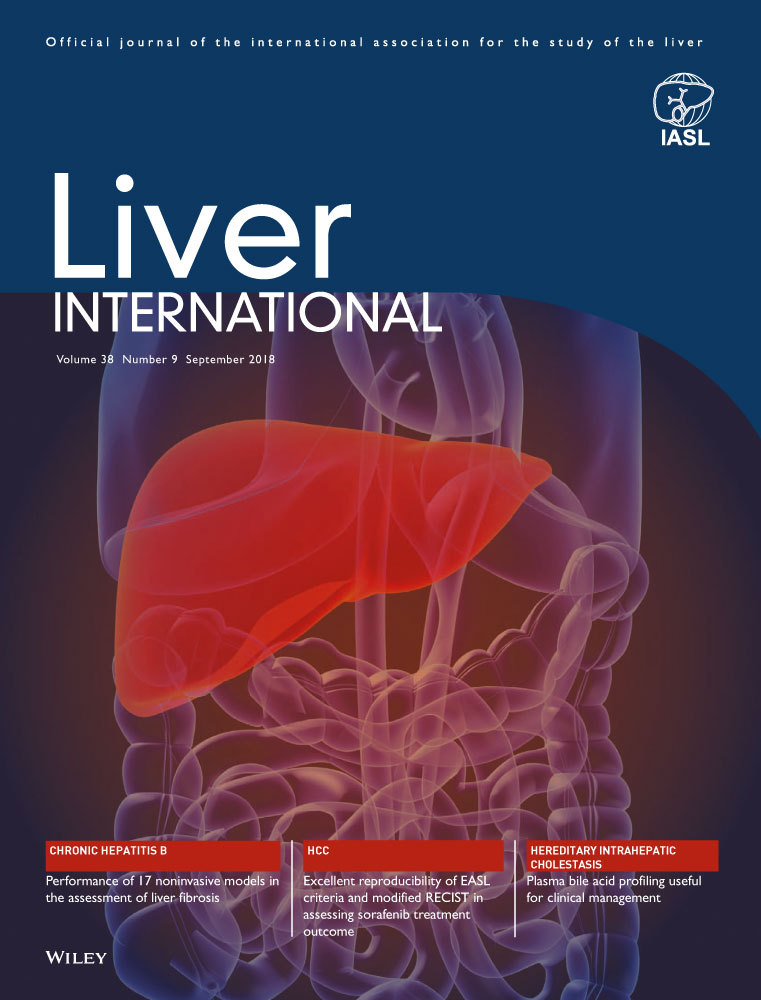Efficacy of elbasvir and grazoprevir in participants with hepatitis C virus genotype 4 infection: A pooled analysis
Funding information
This study was funded by Merck & Co., Inc., Kenilworth, NJ, USA.
Abstract
Background & Aims
The aim of this integrated analysis was to assess the efficacy of the once-daily combination of elbasvir 50 mg and grazoprevir 100 mg, with and without ribavirin in HCV genotype 4 (GT4)-infected participants enrolled in the Phase 2/3 clinical programme with elbasvir/grazoprevir.
Methods
Treatment-naïve and treatment-experienced participants 18 years of age or older with chronic HCV GT4 infection and baseline HCV RNA ≥10 000 IU/mL were included in the analysis. The analysis population was the full analysis set (FAS; all participants who received at least 1 dose of study medication) and a total of 155 HCV GT4 participants were evaluated. The primary endpoint was sustained virologic response at week 12 (SVR12; HCV RNA less than the lower limit of quantitation at 12 weeks after the completion of study therapy).
Results
Overall, among GT4-infected participants treated with 12 or 16 weeks of elbasvir/grazoprevir ± ribavirin, the SVR12 efficacy rates were 96.4% (107/111) in treatment-naïve participants and 88.6% (39/44) in treatment-experienced participants. The SVR12 rates were 96.0% (97/101) in treatment-naïve participants treated with 12 weeks of elbasvir/grazoprevir and 100% (8/8) in treatment-experienced participants treated with 16 weeks of elbasvir/grazoprevir plus ribavirin. Efficacy was not impacted by GT4 subtype.
Conclusions
The regimens of 12 weeks of elbasvir/grazoprevir without ribavirin, and 16 weeks of elbasvir/grazoprevir plus ribavirin, were efficacious in HCV GT4-infected treatment-naïve and treatment-experienced participants respectively. Baseline NS5A resistance-associated substitutions did not impact the efficacy of elbasvir/grazoprevir in GT4-infected participants.
CONFLICTS OF INTEREST
TA reports grants from MSD during the conduct of the study, and grants and/or personal fees from MSD, Abbvie, Gilead Sciences, Janssen Pharmaceuticals, BMS and Roche outside the submitted work. HR reports grants and personal fees from Roche, BMS, Gilead Sciences, AbbVie, Janssen-Cilag, MSD, PRA-International, Regulus and Replicor, personal fees from Alnylam and R-Pharm and grants from Boehringer Ingelheim, outside the submitted work. JG reports payment from Merck, made to his institution, during the conduct of the study, and grants and non-financial support, paid to his institution, from MSD, BMS, Gilead, AbbVie, ViiV and Medivir, outside the submitted work. VdL reports personal fees from AbbVie, BMS, Gilead and Merck, outside the submitted work. PP reports grants, personal fees and CME grants to Scripps Health from Merck, grants, personal fees and CME grants to Scripps Health from Gilead, grants and personal fees from BMS, grants and personal fees from AbbVie and grants and personal fees from Janssen, outside the submitted work. MR, PH, EA-A, JW, B-YN, EB and RT are current or former employees of Merck Sharp & Dohme Corp., a subsidiary of Merck & Co., Inc., Kenilworth, NJ, USA, and may own stock and/or hold stock options in the Company. LS reports the following: consulting, advisory committees or review panels for AbbVie, Janssen, MSD, Roche, BMS, Gilead; grant/research support from Roche and MSD; speaking and teaching for Roche, AbbVie, MSD, Gilead, BMS and Janssen.




